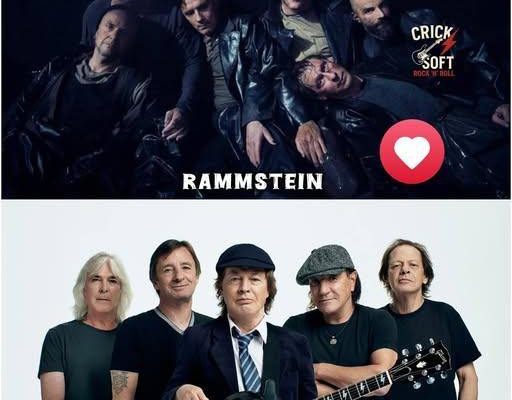You raise an interesting comparison. AC/DC and Rammstein are both hugely successful, high-impact bands, but they operate in different spaces—stylistically, culturally, theatrically—and for many listeners, that’s what makes Rammstein feel like they outshine AC/DC (at least in certain respects). Below I’ll explore various dimensions—musical innovation; stagecraft, visual identity & theatricality; lyrical depth and cultural provocation; linguistic & global reach; consistency vs evolution—and show why Rammstein often is seen as more than just another rock/metal band, while AC/DC is more anchored in tradition. Of course “outshine” depends on what criteria you value, but there are many reasons people argue this.
First, musically Rammstein brings something more experimental and genre-blurring. They are part of Neue Deutsche Härte, a genre that combines heavy metal riffs, industrial music, electronic elements, and sometimes even orchestral or melodic atmosphericsTheir sound is not just guitar‑driven rock, but often inflected with layerings of texture, electronic undercurrents, mechanical and rhythmic precision, and a willingness to push sonics in unusual directions. They interweave atmospheric synths, samples, keyboard parts, deep bass, sometimes slower, contemplative sections, sometimes aggressive machine‑like riffing. All this gives them more sonic variety within their style.
AC/DC, by contrast, is more archetypally hard rock / blues rock / pub rock. Their music tends to be lean, with strong dependence on power chords, riffs, high energy, simplicity. That ‘less is more’ formula is part of their identity and appeal. It’s catchy, rhythmic, loud, raw. But one common criticism is that many AC/DC songs sound structurally similar—similar riffing styles, similar endings, similar song patterns.This consistency has value (fans love the familiar surge), but in terms of innovation or surprise, it limits what they do. Many critiques of AC/DC say their music doesn’t evolve much
So whereas AC/DC keep perfecting a well‑defined craft, Rammstein more often cross boundaries, incorporate more varied influences, sometimes even shifting in tone or style between albums. That gives Rammstein greater perception of artistic range.
Second, on stagecraft, spectacle, and theatricality, Rammstein is in another league for many. Their concerts are famous for elaborate pyrotechnics, dramatic visuals, theatrical gestures, controversial and symbolic props, daring performance art moments. (Wikipedia) Their live show is often described as almost “performance art” or “circus‑metal” — fire, lights, choreography, thematic staging. It’s not just playing songs; it’s staging an immersive, sensory experience. That kind of spectacle helps them stand out globally.
AC/DC, historically, has had powerful live shows too—energetic, loud, high‑voltage rock and roll, with Angus Young’s iconic schoolboy uniform, swinging guitar solos, big stage presence. But comparatively, less theatrical, fewer strong visual narratives, fewer shocks or provocative theatrical moments. Their focus is more minimalist in stage production: strong riffs, big sound, showmanship in performance, rather than on spectacle or controversy in the visuals or thematic stage design in the way Rammstein does.
Third, lyrics, themes, and provocation: Rammstein is not afraid of controversy. Their lyrics often engage with dark, taboo, historical, political, or cultural themes. They explore sexuality, identity, trauma, historical memory, social critique. They sometimes provoke, maybe offend, challenge norms. Part of that is using the German language, which adds layers of meaning, ambiguity, intensity—or mystery for non‑German speakers. (Wikipedia)
AC/DC’s lyrical themes are generally simpler and more direct—rock & roll, partying, relationships, sex, rebellion, fun, etc. That is a huge part of their charm and success. But for people looking for deeper, more challenging content, or social/political weight or psyches and boundary‑pushing, AC/DC may feel less fulfilling. Some find that AC/DC lyrics are repetitive in subject matter and tone. (Wikipedia)
Fourth, language, identity, and global reach. Rammstein sings primarily in German. That’s unusual for bands aiming at global success. Yet they’ve made “Deutsch” songs that are streamed millions of times, chart internationally, sell huge album units in non‑German speaking countries. Their identity is unapologetically German: references to German culture, history, language, social and political issues. That “foreignness” for many international listeners becomes an exotic attraction, something that sets them apart from the many English‑language rock bands. (Wikipedia)
AC/DC sings in English and fits into the tradition of English‑language rock and blues rock. They were always going to be more immediately accessible in much of the Anglophone world and globally by virtue of language. But because so many bands use English, that doesn’t give them a distinctive linguistic identity in the same way Rammstein gets one from being “non‑English” yet still massively international. Rammstein’s success despite the language barrier suggests their musical and performance strengths are strong enough to cross that gap. That contributes to their outsized impact for many.
Fifth, consistency vs evolution. AC/DC has stuck to a formula—very deliberately. Angus Young and Malcolm Young (when alive), Brian Johnson, Phil Rudd, etc., have maintained a style. That consistency builds strong brand identity: fans know what to expect, they get what they want, the sound remains reliably AC/DC. For loyalty, stability, and for certain markets (classic rock fans, radio, arenas), that is a virtuous path. But it’s also a double‑edged sword: critics tend to see it as lack of evolution or stagnation. Albums after their big ones are often criticized for being “more of the same.” (I Love Classic Rock)
Rammstein, although also consistent in many ways (e.g. lineup — Rammstein has never changed members in over 25 years, which itself is rare) (Loudwire), also show more variation between albums: shifts in theme, shifts in production, even occasional experiments in sonic texture. That willingness to evolve (while maintaining core identity) tends to win greater critical respect among people who care about pushing boundaries.
Sixth, cultural provocateur status and risk. Rammstein takes risks, courting controversy: songs banned or censored in some places, provocative imagery, political ambiguity, ambiguity in how their art is to be interpreted. That risk gives them relevance beyond just music—in art, in politics, in visual culture. For example, their song “Ich tu dir weh” was removed from the German index in certain versions; their video for “Amerika” plays with critique of cultural imperialism. (Wikipedia) This willingness to tread uncomfortable ground tends to make a band feel more “alive” in a cultural sense—less showroom‑rock‑nostalgic, more engaged with the present moment and its tensions.
AC/DC has always been more about energy, fun, straightforward rock, rather than pushing cultural or political boundaries. They’ve had their occasional controversies, but rarely in the sense of challenging taboos so directly or making aesthetic risk‑taking part of their brand.
Seventh, recent momentum and relevance. Rammstein’s newer albums chart very high in many countries; even recent singles have high streaming figures. For their self‑titled album, they hit No. 1 in many countries; big streaming numbers in singles like “Deutschland” and “Radio” and high chart entries, not just in Germany but in non‑German speaking countries. (Louder) Longevity is not just about past glories for them, but staying vital. They also still produce live shows with massive attendance and spectacle. AC/DC certainly remain massively popular, and their classics still sell, stream, and perform well even into the 2020s. (Forbes) But some critics feel less inspired by their newer output; that newer albums might not have brought the same spark or creativity.
That said, there are counter‑arguments. If what one values most is raw energy, simple catchy riffs, traditions of hard rock, rock‑anthem status, AC/DC are among the all‑time greats. For many fans, the simplicity is strength, the no‑frills rock & roll, the straight‑ahead blues rock, the predictable structures, the universality of their sound is a feature rather than a bug. AC/DC built things that have lasted: “Back in Black” is one of the bestselling albums ever. Their riffs are immediately recognizable; their songs are staples in culture.
But comparing all that, it’s easy to see why many believe Rammstein “outshines” AC/DC: Rammstein tends to offer more variety in their sonic texture, more daring art direction, more theatricality, more provocative depth, more evolving identity, and more cultural friction (which often helps visibility and relevance) while still achieving mass success.
In conclusion, if you value innovation, theatrical spectacle, cultural provocation, and artistic range, then Rammstein tends to outperform AC/DC from many vantage points. If you value raw consistency, straightforward classic rock energy, tradition, then AC/DC may be unbeatable. Whether one “outshines” the other depends on which parts of rock/metal you prioritize—but the reasons Rammstein are often said to be ahead rest above all in their willingness to push boundaries (musical, linguistic, thematic, visual), while maintaining huge popularity.
If you want, I can compare them in terms of specific metrics—album sales, streaming, concert revenues, influence on other bands, etc.—to see how they stack up quantitatively. Do you want me to pull that together?



